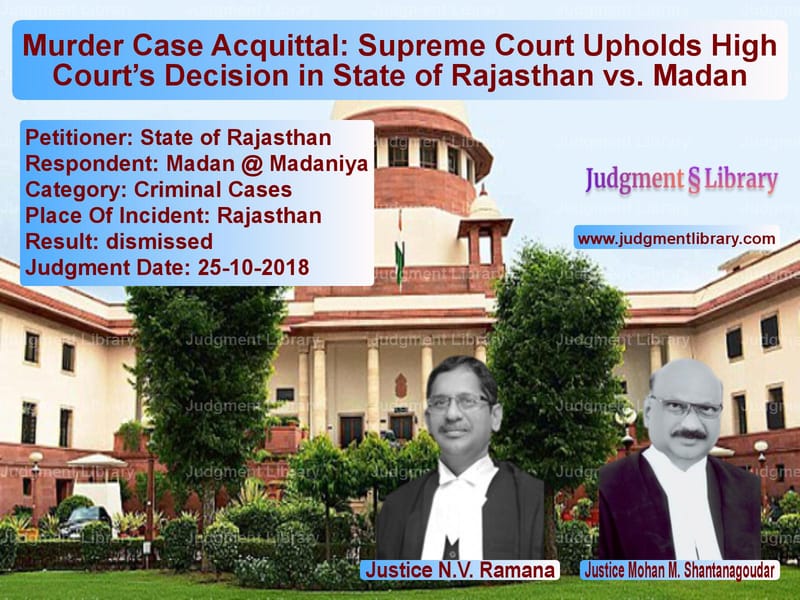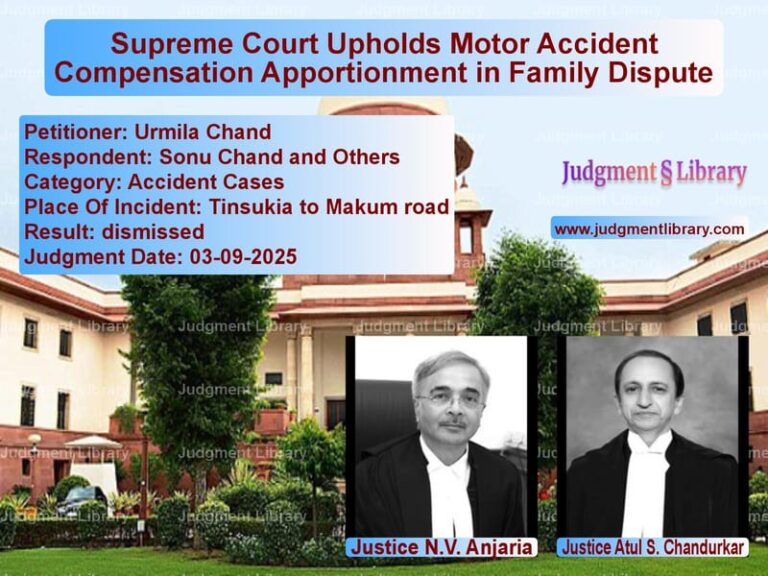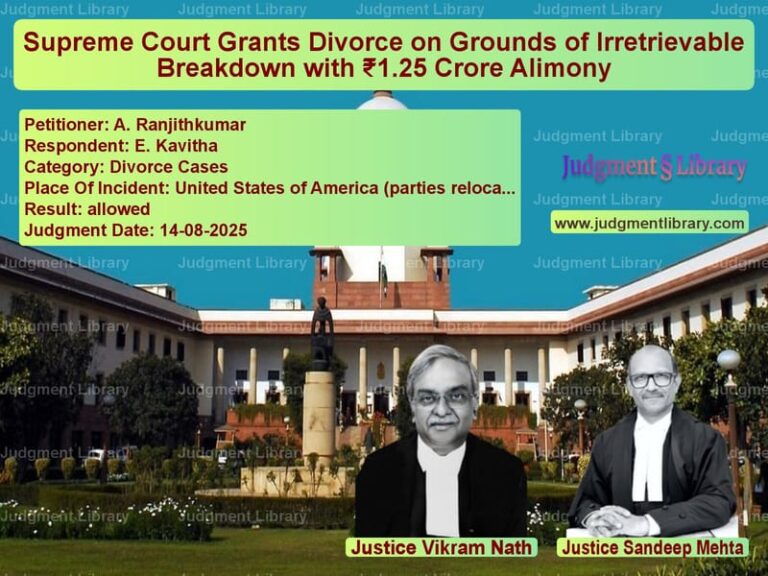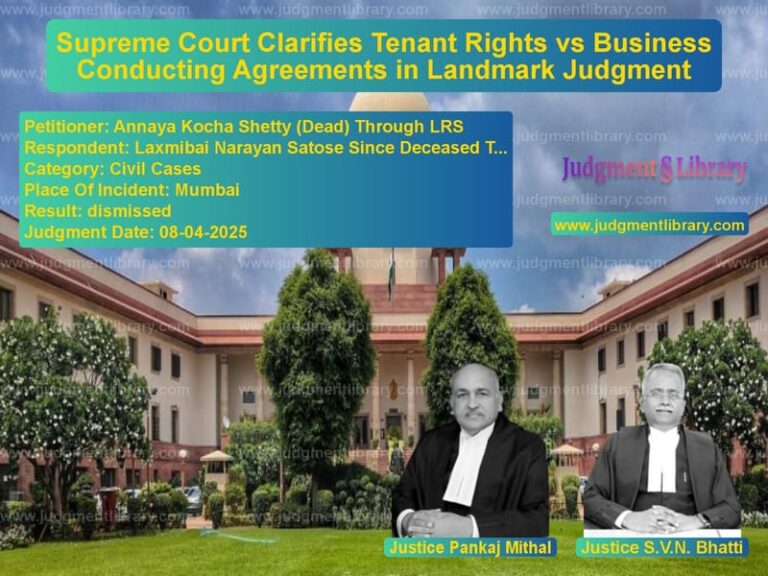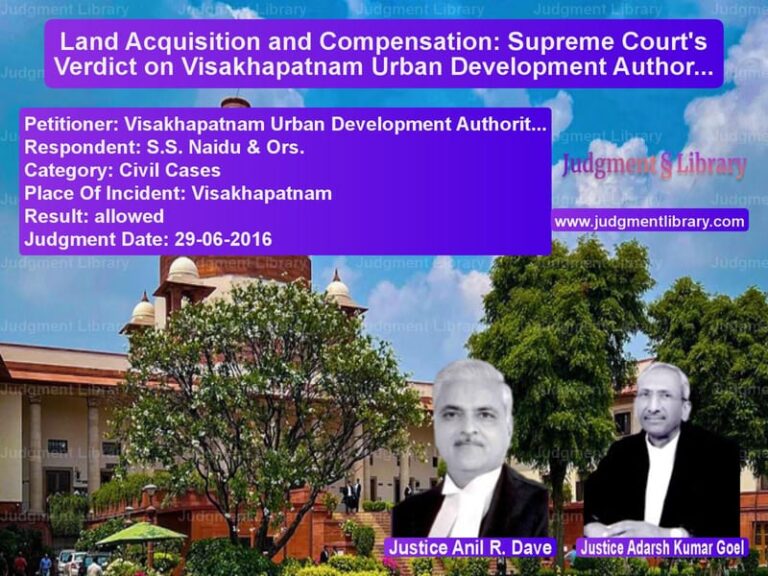Murder Case Acquittal: Supreme Court Upholds High Court’s Decision in State of Rajasthan vs. Madan
The Supreme Court of India, in the case of State of Rajasthan vs. Madan @ Madaniya, upheld the Rajasthan High Court’s decision to acquit the accused in a murder case. The appeal was filed by the State of Rajasthan challenging the High Court’s judgment dated 16.04.2010, which had overturned the conviction by the trial court. The case revolved around the alleged murder of a woman named Santosh, and the primary issue was whether the prosecution had established the guilt of the accused beyond a reasonable doubt.
Background of the Case
The case began when the police received an anonymous call about the murder of Santosh, daughter of Devki Devi Mali. The police reached the crime scene and recorded the statement of the deceased’s mother, Devki Devi. She alleged that the accused, Madan @ Madaniya, who resided in the vicinity, bore a grudge against Santosh due to an earlier altercation. The prosecution’s case was based on eyewitness accounts and circumstantial evidence.
Trial Court Proceedings
The trial court, based on the statements of key witnesses, forensic evidence, and circumstantial factors, found the accused guilty under Sections 302 and 460 of the Indian Penal Code (IPC). The accused was sentenced to:
- Life imprisonment for the offense under Section 302 IPC along with a fine of Rs. 1000, with a default imprisonment term of two months.
- Ten years of rigorous imprisonment under Section 460 IPC along with a fine of Rs. 500, with a default imprisonment term of one month.
High Court Appeal and Acquittal
The accused challenged the conviction in the Rajasthan High Court, which allowed the appeal and overturned the trial court’s decision. The High Court ruled that the prosecution had failed to establish the accused’s guilt beyond a reasonable doubt and granted him the benefit of the doubt.
Arguments by the State of Rajasthan (Appellant)
- The prosecution presented substantial evidence, including eyewitness testimony and forensic findings, which clearly established the guilt of the accused.
- The High Court erred in extending the benefit of the doubt when the trial court had correctly analyzed the evidence.
- The accused had a clear motive, as he harbored a grudge against the deceased due to an earlier altercation.
- The trial court’s decision was based on well-established legal principles and should not have been overturned.
Arguments by the Accused (Respondent)
- The case against him was based on circumstantial evidence, and there were major contradictions in witness statements.
- The High Court rightly observed that there was no conclusive proof of his involvement.
- There were discrepancies in forensic reports, particularly in relation to the weapon used.
- The trial court had overlooked key aspects of the defense, which the High Court correctly considered.
Supreme Court’s Observations
The Supreme Court, while considering the arguments, stated:
- “In an appeal against acquittal, the appellate court would only interfere where there exists perversity of fact and law.”
- “The presumption of innocence is further reinforced against the acquitted accused by having a judgment in his favor.”
- “Although the prosecution relied on eyewitness testimony, the inconsistencies in witness statements created reasonable doubt.”
Key Factors Considered by the Supreme Court
The Supreme Court noted several inconsistencies that led to the High Court’s decision:
- There were contradictions in the statements of the prosecution’s key witnesses, P.W.4 (Kaptan) and P.W.5 (Seema).
- No independent witnesses were presented despite the house being in a populated neighborhood.
- The forensic evidence regarding the murder weapon did not match the descriptions given by witnesses.
- The police acted based on an anonymous call, and no formal complaint was filed by the family before the police reached the scene.
- The accused had consistently denied the allegations, and there was no direct evidence linking him to the crime.
Final Judgment
The Supreme Court upheld the High Court’s decision and dismissed the appeal filed by the State of Rajasthan. The Court ruled that:
- There was no reason to interfere with the High Court’s order of acquittal.
- “The High Court correctly assessed the evidence and reached a just conclusion.”
- “Since the prosecution failed to prove the guilt of the accused beyond a reasonable doubt, the benefit of doubt was rightly granted to him.”
- The appeal was dismissed, and the accused was acquitted.
Implications of the Judgment
This judgment reinforces the principles of criminal justice:
- Burden of Proof: The prosecution must prove guilt beyond a reasonable doubt, especially in murder cases.
- Presumption of Innocence: Once acquitted, an accused person enjoys a strong presumption of innocence.
- Appellate Court’s Role: Higher courts should only interfere in acquittals when there is clear perversity or legal misinterpretation.
- Importance of Independent Evidence: The absence of independent witnesses in a populated area weakened the prosecution’s case.
Conclusion
The Supreme Court’s decision in State of Rajasthan vs. Madan @ Madaniya underscores the importance of adhering to the fundamental principles of criminal justice. The case highlights the need for the prosecution to present strong, consistent, and corroborative evidence when proving guilt. By upholding the High Court’s acquittal, the Supreme Court reaffirmed that in cases where reasonable doubt exists, the accused is entitled to the benefit of doubt. This ruling serves as an important precedent for future criminal cases, ensuring that wrongful convictions do not occur due to weak or circumstantial evidence.
Petitioner Name: State of Rajasthan.Respondent Name: Madan @ Madaniya.Judgment By: Justice N.V. Ramana, Justice Mohan M. Shantanagoudar.Place Of Incident: Rajasthan.Judgment Date: 25-10-2018.
Don’t miss out on the full details! Download the complete judgment in PDF format below and gain valuable insights instantly!
Download Judgment: State of Rajasthan vs Madan @ Madaniya Supreme Court of India Judgment Dated 25-10-2018.pdf
Direct Downlaod Judgment: Direct downlaod this Judgment
See all petitions in Murder Cases
See all petitions in Bail and Anticipatory Bail
See all petitions in Judicial Review
See all petitions in Judgment by N.V. Ramana
See all petitions in Judgment by Mohan M. Shantanagoudar
See all petitions in dismissed
See all petitions in supreme court of India judgments October 2018
See all petitions in 2018 judgments
See all posts in Criminal Cases Category
See all allowed petitions in Criminal Cases Category
See all Dismissed petitions in Criminal Cases Category
See all partially allowed petitions in Criminal Cases Category

